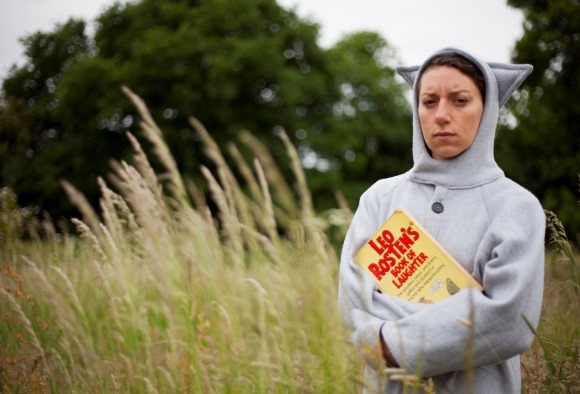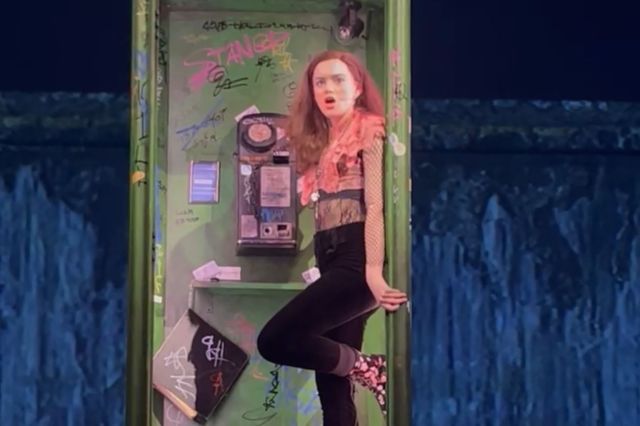Brief Encounter With …The Way You Tell Them's writer and performer Rachel Mars
Rachel Mars’ latest touring show ”The Way You Tell Them” turns the spotlight on the inner workings of comedy, the desire and, sometimes uncontrollable, compulsion to be funny. Where does the responsibility lie when going for a laugh? We find out more.

Can you tell us a bit about your show?
I've been making theatre for twelve years, and I pretty much always make work that is funny. A couple of years ago a stand-up comedian friend decided to stop trying to be funny all the time in her personal life, and I started thinking about how that would work for me. My family joke all the time, it's part of how we are with each other, so I knew it would be a challenge. That experiment led to the show, which is about how we (and the world at large) use and abuse humour. It's about families, jokes, and coping with difficult things, and some of the more questionable things I've done over the years to get a laugh!
Who do you find funny and why?
I really love silliness and when it's combined with genuine skill that's killer. As a TV audience member, I've always loved Morecambe and Wise. I grew up watching them. I can watch the Andre Previn sketch daily and still find it funny. I think it's the combination of Morecambe's high status clown and the warmth of their piss-taking, plus genuine talent in dancing. Last year I got into deep trouble watching 'The Two Wrongies' – a Brighton based dance-comedy twosome. They do a totally naked synchronised swimming routine, delivered with total earnestness. I nearly stopped breathing and thought I might be sick. Closer to home I find my family very funny. My 97 year old grandma is living with my parents and we lurch from hilarity to chaos hourly.
Many great comedy stars bring humour from sad events. Where does yours come from?
That's one of the main questions in the show. I think we all use humour to deal with painful things and mostly that works out really well. Sometimes it masks the inability to be vulnerable, and to open ourselves to genuinely feeling anything. I think my humour comes from a family history soaked in death, with a whole generation wiped out by Hitler. On the page, that sounds about as unfunny as you get, and the facts of it are awful. However, the humour that comes out of coping with it is very seductive, it's dark; about survival, revenge and celebration.
Why do you think Stand Up Comedy has become the new rock 'n' roll selling out big arenas all over the UK?
It's down to TV. Stand-up really fell off TV programming in the nineties, but alternate cult comedy was still doing well. Then in the mid 2000s you get Live at the Apollo and Michael McIntyre's Comedy Roadshow which are brilliant for show-casing comedians who have been doing the club circuit for years. They then get the exposure which boosts their touring shows, which often look exactly like the TV shows. People can see what they are going to get. I also think it points to a desire for a live, communal experience. Watching a routine a mate has bounced you on the internet allows you to meet a stand-ups work, but it doesn't give you the same feeling of being in an arena.
What do you think of comedians who set out to shock?
It depends on the what the comedian's project is. Who is the target and why? I like some comedians that shock – Joan Rivers, Richard Pryor, but I like them because they were/are pushing against societal boundaries and drawing our attention to the ugly and the unjust in our human nature and our relationships. Joan Rivers had a disabled husband, and she makes jokes about it. But the gags are about her fury and impatience with him. She is ultimately the target in that set – her failures as a carer, not his physical impairments.
Some comedy is shocking just because of the unusualness of its form, someone like Andy Kaufman was shocking because he was happy to inflame an audience by reading to them and refusing to tell any jokes. I find that very exciting, because it makes us question what entertainment is, what we're after when we come to see comedy. I think comedians who set out to shock in the content of their material need to punch up – attacking power and it's misuse for example. When Frankie Boyle got taken to court and accused of racism I thought the Daily Mirror had got it totally wrong, and that he was satirising racists. When he took the piss out of [the swimmer] Rebecca Adlington's appearance I thought it was unnecessary and lazy. It's when people punch down to get a laugh that it seems cheap and you wonder about where the responsibility is in going for a laugh.
What makes your show unique?
Every audience makes the show a different beast. Although it's not a stand-up show there is a lot of impro, chatting with the audience. It's a show that allows me to play the room, rather than just play the script. So I never know what kind of territory we are going to get into until I'm on stage.
Who is the target audience?
Anyone who has ever thought about they cope with difficult things. People who like jokes. Also, people who hate jokes and wish their friends and family would cut it out.
What are you looking forward to the most about the show?
There's one particular sequence that I love. It's a bit of a risk. The response to it is always different depending on each audience. Sometimes people are sick with laughter and other times there is total silence. I always look forward to seeing which way it might go.
Rachel Mars is touring the UK, including Manchester's Contact Theatre on 13 March. For further tour dates, please click here.












